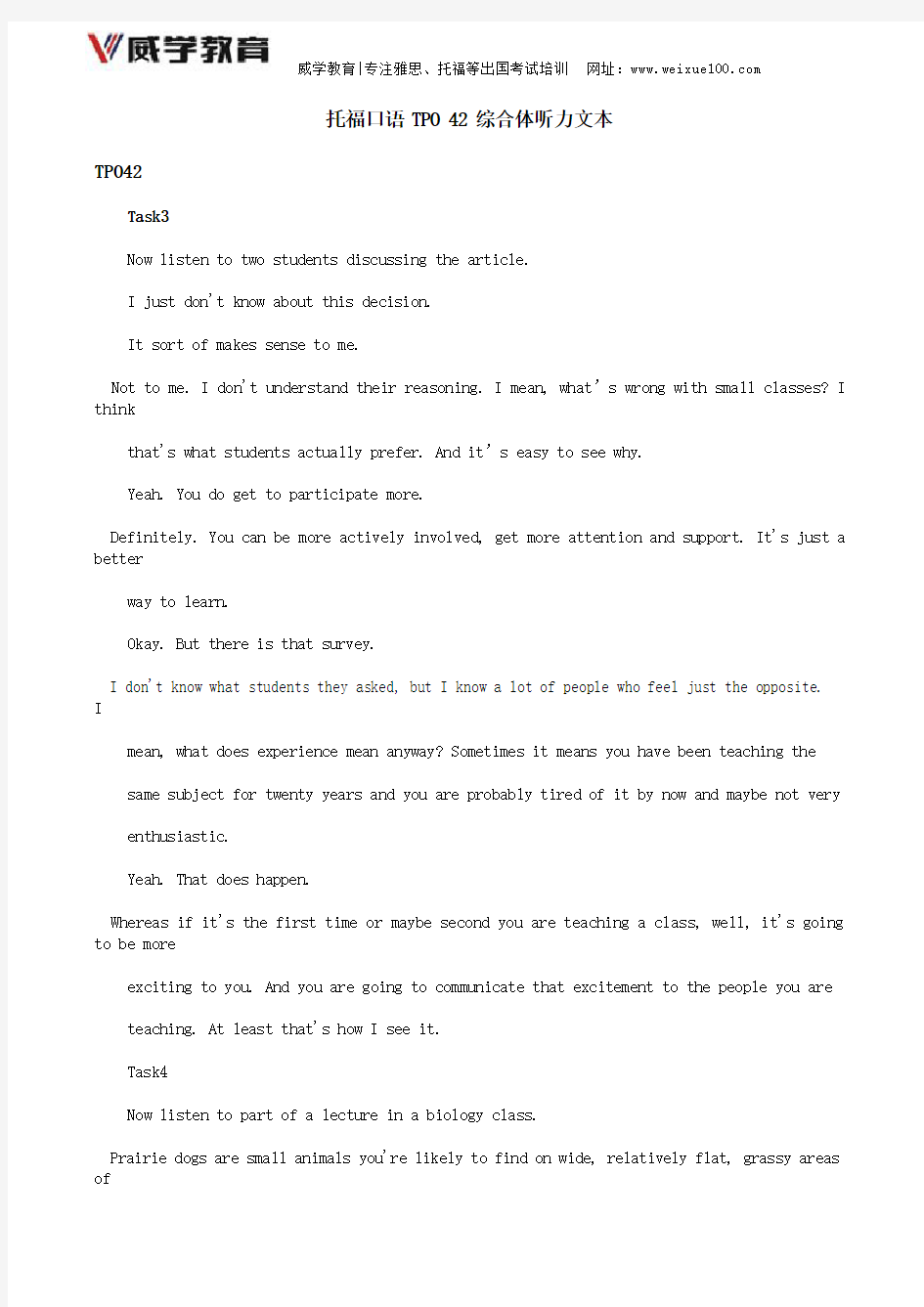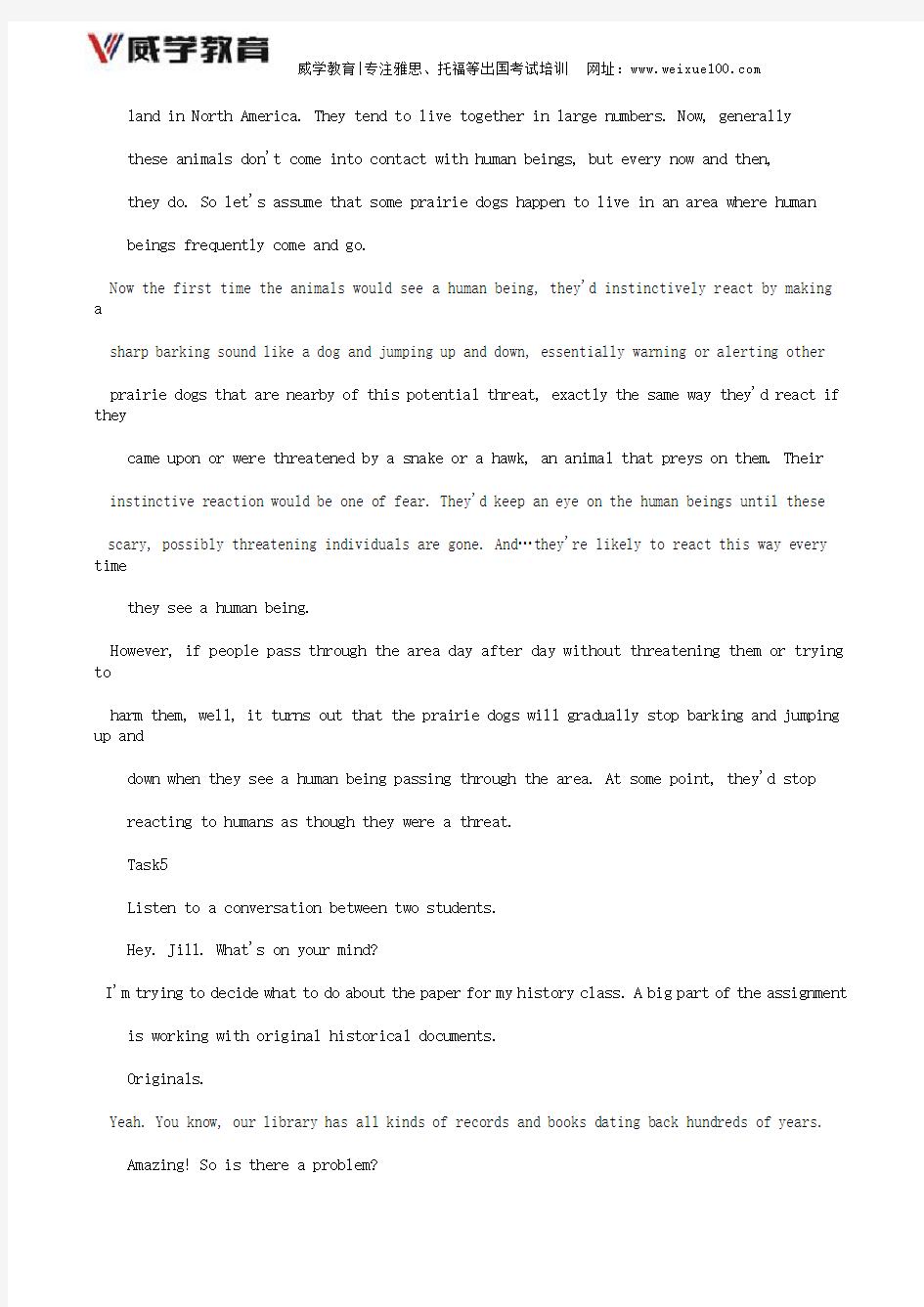【威学教育】托福口语TPO42综合体听力文本


托福口语TPO42综合体听力文本
TPO42
Task3
Now listen to two students discussing the article.
I just don't know about this decision.
It sort of makes sense to me.
Not to me. I don't understand their reasoning. I mean, what’s wrong with small classes? I think
that's what students actually prefer. And it’s easy to see why.
Yeah. You do get to participate more.
Definitely. You can be more actively involved, get more attention and support. It's just a better
way to learn.
Okay. But there is that survey.
I don't know what students they asked, but I know a lot of people who feel just the opposite. I
mean, what does experience mean anyway? Sometimes it means you have been teaching the
same subject for twenty years and you are probably tired of it by now and maybe not very
enthusiastic.
Yeah. That does happen.
Whereas if it's the first time or maybe second you are teaching a class, well, it's going to be more
exciting to you. And you are going to communicate that excitement to the people you are
teaching. At least that's how I see it.
Task4
Now listen to part of a lecture in a biology class.
Prairie dogs are small animals you're likely to find on wide, relatively flat, grassy areas of
land in North America. They tend to live together in large numbers. Now, generally
these animals don't come into contact with human beings, but every now and then,
they do. So let's assume that some prairie dogs happen to live in an area where human
beings frequently come and go.
Now the first time the animals would see a human being, they'd instinctively react by making a
sharp barking sound like a dog and jumping up and down, essentially warning or alerting other
prairie dogs that are nearby of this potential threat, exactly the same way they'd react if they
came upon or were threatened by a snake or a hawk, an animal that preys on them. Their
instinctive reaction would be one of fear. They'd keep an eye on the human beings until these
scary, possibly threatening individuals are gone. And…they're likely to react this way every time
they see a human being.
However, if people pass through the area day after day without threatening them or trying to
harm them, well, it turns out that the prairie dogs will gradually stop barking and jumping up and
down when they see a human being passing through the area. At some point, they'd stop
reacting to humans as though they were a threat.
Task5
Listen to a conversation between two students.
Hey. Jill. What's on your mind?
I'm trying to decide what to do about the paper for my history class. A big part of the assignment
is working with original historical documents.
Originals.
Yeah. You know, our library has all kinds of records and books dating back hundreds of years.
Amazing! So is there a problem?
Uh-huh. The librarian just told me that the documents I was planning to use aren't available right
now. They are old newspapers and they were in pretty bad shape, so the library sent them out for
repairs, like, restoration work.
So you can't use them.
No. They say they won't be available for at least another two weeks. So I can't work on my paper.
Well, can you change what you are writing about? You know, choose a topic that doesn't involve
those documents.
I could. There are plenty of historical topics. Then I could really get working on the paper right
away, but…
But what?
Well, I've already done a bunch of research on my current topic. I've collected a lot of information
and I wouldn't be able to use any of it if I changed my topic.
Well, when did you say the documents, the old newspapers, will be available?
The librarian said two weeks.
So you could just postpone working on the paper, wait until they are available.
Possibly. Unfortunately that would mean doing major work on my paper in the last week of the
school term, when I will be working on a lot of other things.If I change the topic, I can really work
on the paper right away.
Task6
Now listen to part of a lecture in an environmental studies class.
What happens, biologically speaking, when a major climate change occurs? Well, scientists
generally agree that the extinction of various animal and plant species is one very likely effect.
This has happened in the past. An example is, is the disappearance, 35,000 years ago, of a giant
Australian bird, called the thunderbird.
Now, now, these birds were so big they couldn't fly. But as I was saying, many scientists are
convinced that it was a change in climate that caused this species to become extinct. Here's the
evidence. Here's why scientists think it was a climate change.
Researchers have discovered an enormous number of 35,OOO-year-old thunderbird bones, all
together in one spot. The bones were found near an ancient, dried-up lake. Now, it's really rare to
find so many bones from the same species in one place, but there it is. You have all these
35,000-year-old thunder bird bones all together near this dried- up lake. So what's the
explanation?
Well, many scientists believe that a change in the Australian climate may be behind this. Their
hypothesis is, they think that during a very long, dry period, when there was no rainfall, the birds
may have flocked together at this lake. You see, during a drought, animals tend to gravitate
towards the last few remaining water sources. But then if it still doesn't rain, if the drought lasts
too long, the water source may dry up too. And…and if that happens, the animals that have
gathered there…well…well...well...they die.
Scientists think, this ancient lake, where they found the bones, was one of the last remaining
sources of freshwater during the drought. So that's where all these birds gathered. They survived
there for a time, but eventually the lake dried up. And well...that was it. By the time the
drought ended, the species was extinct.
